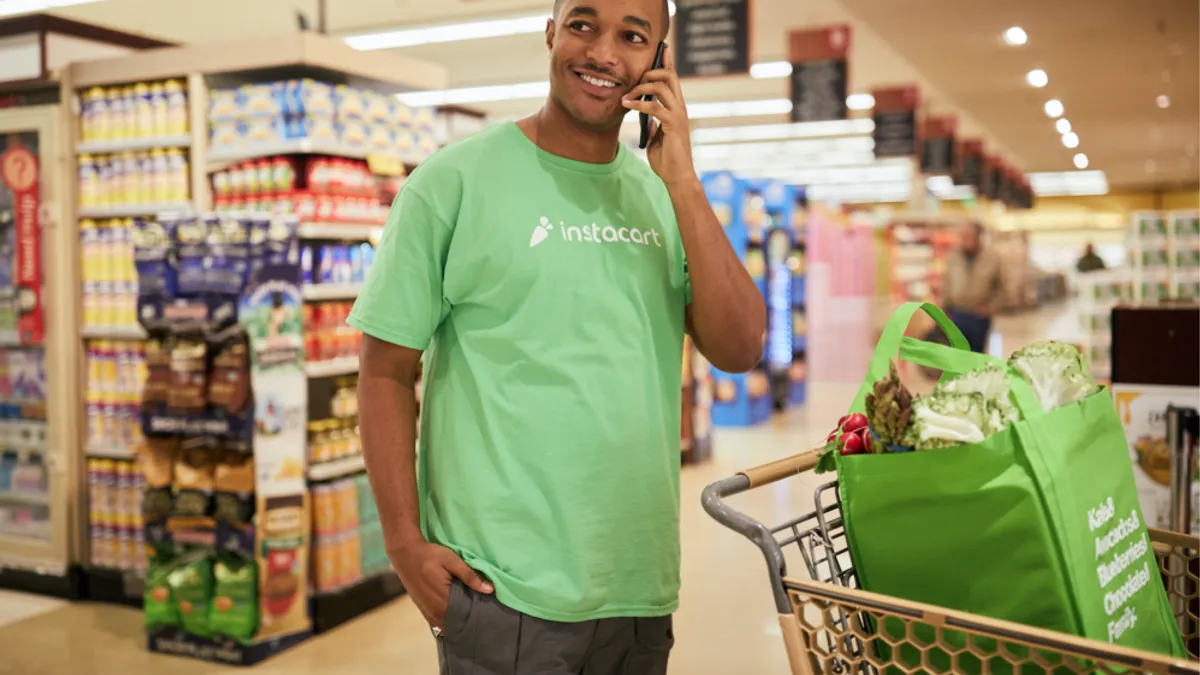UPDATE: June 16, 2020: The Seattle City Council on Monday unanimously approved a bill requiring food delivery companies like Instacart and DoorDash to pay drivers an additional $2.50 per trip. The bill had originally proposed a $5-per-trip added payment, but the bill's sponsors agreed to halve it after holding conversations with service providers and labor groups. Instacart has asked Mayor Jenny Durkin to veto the bill, according to GeekWire. The rule, which lasts the duration of the COVID-19 emergency order the city enacted in March, prohibits Instacart and other service providers from reducing worker benefits and service areas, and from passing the added cost along to consumers.
Dive Brief:
- Instacart is threatening to leave Seattle over a bill that would require the company to pay its contract workers an extra $5 per trip, according to a report in GeekWire. The emergency bill, which will be up for a vote before the city council Monday, applies to any grocery delivery, food delivery and ride-sharing companies operating in the city that have more than 250 workers globally.
- Instacart has posted ads on social media and sent emails urging local customers to contact Seattle lawmakers and voice their opposition to the bill. “On Monday, the Seattle City Council is threatening to pass unconstitutional legislation that would impact Instacart’s ability to operate in Seattle and cause significant disruption to the only affordable, accessible grocery delivery in the city,” the company wrote. The company said the bill’s passage could impact 5,500 contract workers and 90 local stores.
- Earlier this month, Seattle passed a law requiring gig companies like Uber and Instacart to provide paid sick days for their contract workers. Workers collect one paid sick day for every 30 days worked, with pay based on their average earnings.
Dive Insight:
The COVID-19 pandemic has dramatically increased consumers’ reliance on food delivery drivers, boosting business for companies like Instacart and DoorDash but also increasing calls for additional pay and benefits for the gig workers putting themselves at risk.
Seattle is so far the only city to have formally proposed hazard pay and passed a sick leave policy for gig workers. But legislators in San Francisco, New York and other cities have proposed added pay and protections for on-demand and essential workers. As the pandemic continues, and with cases spiking in some states and a virus surge threatening in the fall, the calls for additional protections could increase.
Companies say they’re already providing adequate protection and compensation for on-demand workers. DoorDash has told media outlets its minimum wage right now is $26 per active hour, while Instacart has pointed to its sick-leave policy and protective equipment it has provided for workers. Instacart has also instituted steps like contactless payments at stores and doorstep delivery.
Workers have criticized Instacart over difficulties securing their equipment and getting approved for temporary paid leave. The company, meanwhile, has seen its market share skyrocket as its fast-growing gig workforce has met surging demand from homebound shoppers. Instacart last week announced it has received $225 million in new funding.
In its response to Seattle’s hazard pay bill, Instacart attempted to paint the measure as legislative overreach while still displaying compassion for workers and consumers. The letter sent to shoppers said workers would lose access to “immediate flexible income,” that residents sheltering in place “could lose access to grocery and prescription drug delivery” and that “more than 90 beloved neighborhood and regional stores across Seattle may be unable to serve customers.”
Grocery companies have had to balance business realities with the public’s high regard for store and warehouse workers as well as delivery drivers. Many retailers implemented hourly and one-time bonuses early in the pandemic and are now having to decide if they’ll extend those bonuses or let them end. Kroger faced significant backlash last month when it announced it would end its hourly pay bumps for its more than 400,000 workers.













